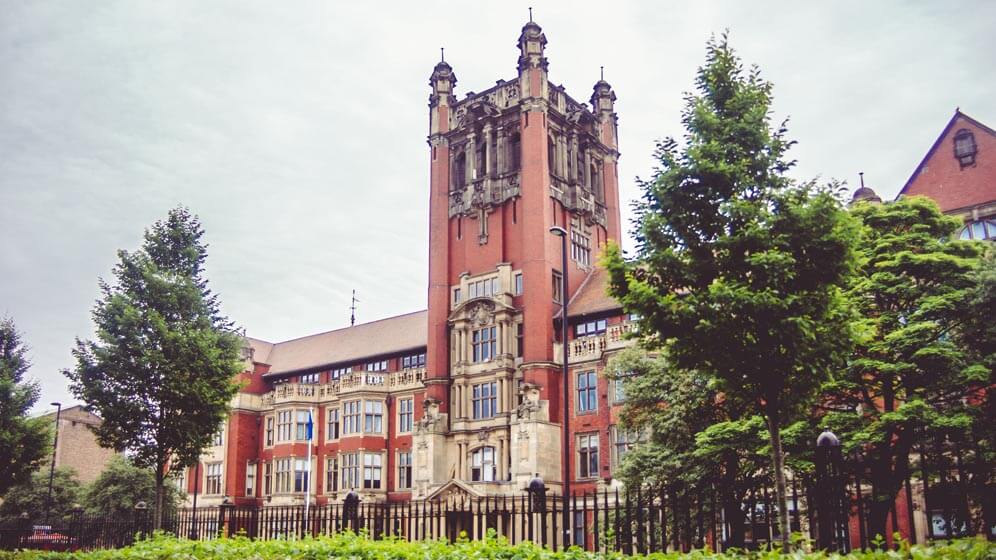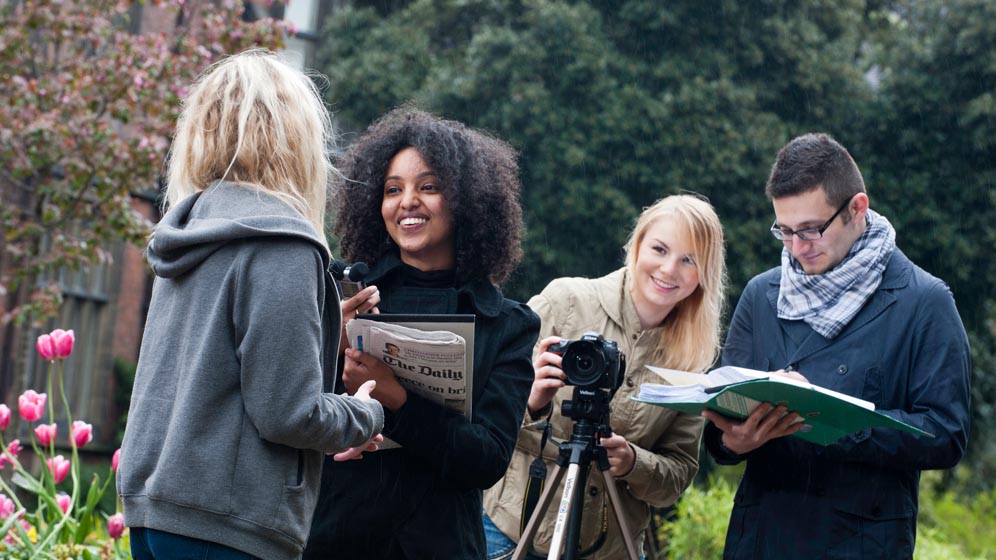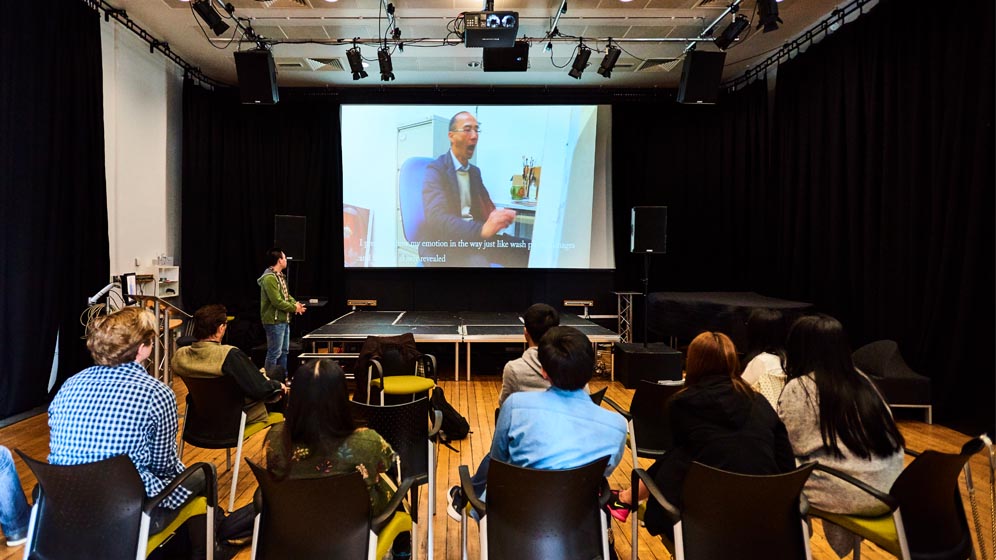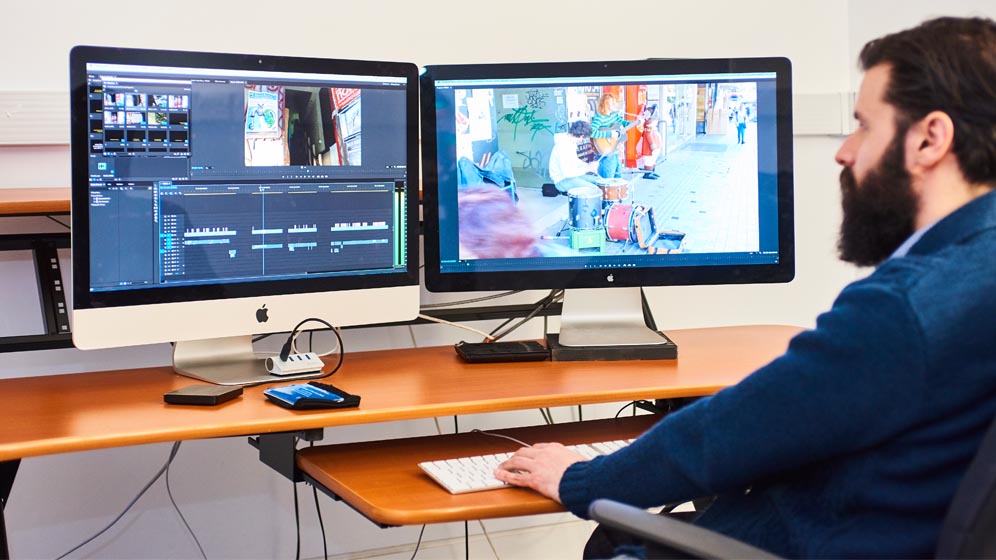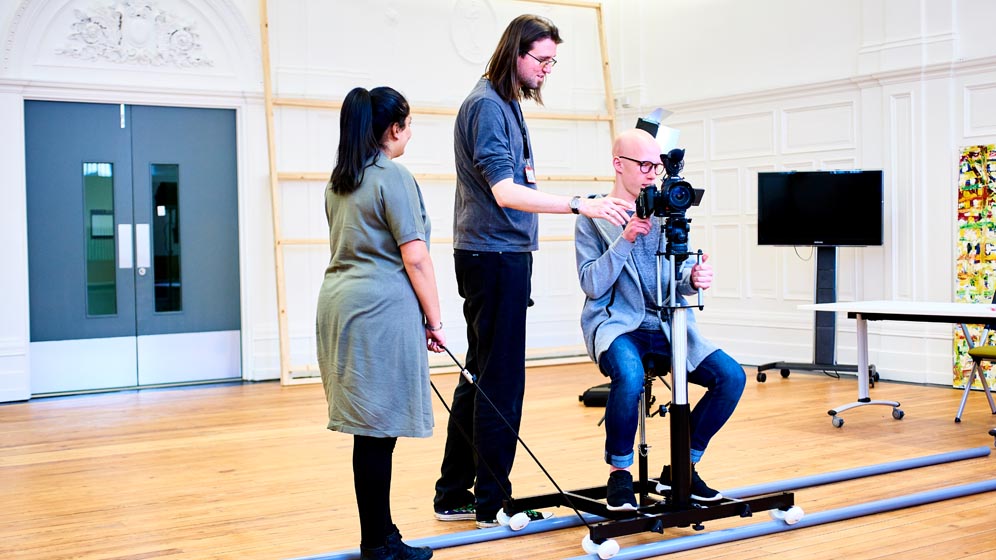Media, Communication and Cultural Studies BA Honours
- UCAS code: PQL0
- Full time
- 3 years
Explore the role media plays in shaping culture and society. Prepare yourself for a career as a media professional with an understanding of political and ethical approaches to social justice issues.
You are currently viewing course information for entry year: 2026
Next start date:
- September 2026
UCAS Institution name and code:
- NEWC / N21
Course overview
Our three-year Media, Communication and Cultural Studies degree focuses on critical thinking and practical skills. We combine theory and practice informed by:
- social justice
- equality, diversity and inclusivity
- contemporary issues surrounding technology and culture
With a variety of optional pathways to choose from, you'll have the opportunity to gain the skills needed for a career in professional communications.
Our world-leading academics teach a wide range of modules that cover Media, Culture and Communications, allowing you to critically engage with processes and structures of meaning-making, knowledge and power.
We see our graduating students as agents of change: working successfully within the media, while using the skills learned on this programme to make the media more equitable and fairer for everyone.
Your learning is led by our renowned team of academics who are always exploring new ideas and methods to ensure your degree is of the highest quality. Their research feeds into your learning in areas such as:
- journalism
- public relations
- marketing and advertising
- cultural studies
You'll explore the generation, circulation and production of information through media, communication and culture. We have a broad selection of modules across these disciplines allowing you to discover and research your own areas of interest.
You'll graduate as a highly skilled media professional, ready for a career across a variety of areas and with a grounding in contemporary political and ethical issues surrounding social justice.
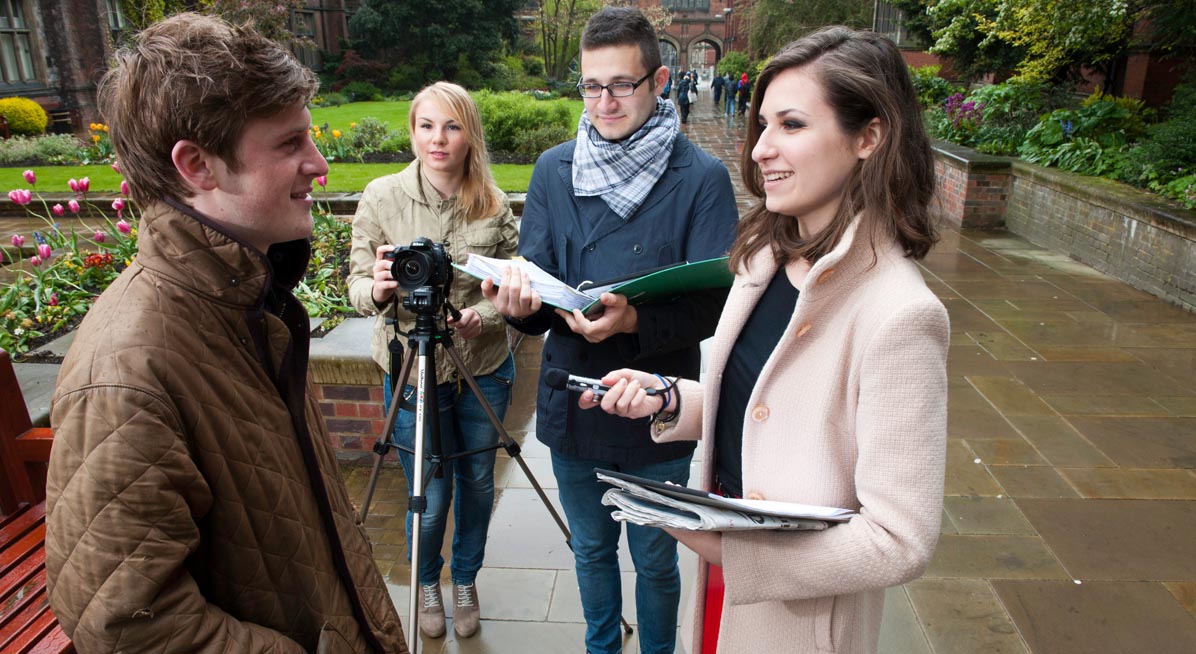
Your course and study experience - disclaimers and terms and conditions
Please rest assured we make all reasonable efforts to provide you with the programmes, services and facilities described. However, it may be necessary to make changes due to significant disruption, for example in response to Covid-19.
View our Academic experience page, which gives information about your Newcastle University study experience for the academic year 2025-26.
See our terms and conditions and student complaints information, which gives details of circumstances that may lead to changes to programmes, modules or University services.
Quality and ranking
Professional accreditation and recognition
All professional accreditations are reviewed regularly by their professional body.
Modules and learning
Modules
The information below is intended to provide an example of what you will study.
Most degrees are divided into stages. Each stage lasts for one academic year, and you'll complete modules totalling 120 credits by the end of each stage.
Our teaching is informed by research. Course content may change periodically to reflect developments in the discipline, the requirements of external bodies and partners, and student feedback.
Optional module availability
Student demand for optional modules may affect availability.
Full details of the modules on offer will be published through the Programme Regulations and Specifications ahead of each academic year. This usually happens in May.
To find out more please see our terms and conditions
You'll explore the role the media plays in shaping culture, identity and interpersonal communications. You will study modules in areas such as media studies, social and cultural studies, marketing communication and promotional practices, multimedia communication, and digital cultures. You will also develop critical skills in media, communication and cultural studies.
Modules
| Compulsory Modules | Credits |
|---|---|
| Digital Cultures | 20 |
| Media Studies | 20 |
| Critical Skills | 20 |
| Social and Cultural Studies | 20 |
| Marketing Communication & Promotional Practices | 20 |
| Multimedia Communication | 20 |
You'll be introduced to theoretical perspectives on media and culture. You'll learn about the process and practice of researching media and culture, as well as understanding their intersectional and political nature.
A wide range of optional modules allow you to focus in more depth on areas of particular interest to you, such as: gender, race, digital media, public relations, journalism, popular culture and advertising.
Modules
| Compulsory Modules | Credits |
|---|---|
| Media Fusions: Creative & Collaborative Projects | 20 |
| Intersectional Approaches in Media & Cultural Studies | 20 |
| Advertising and Consumption | 20 |
| Research Design and Practice | 20 |
Optional module information
You have the opportunity to put the knowledge and skills from Stages 1 and 2 into practice in Stage 3, undertaking a dissertation that focuses on a specific area of media, communication and culture.
A wide range of optional modules allow you to focus in more depth on areas of particular interest to you, such as: gender, race, youth culture, digital media, public relations, political communication, popular culture, journalism, magazine publishing and fashion.
Modules
| Compulsory Modules | Credits |
|---|---|
| Research Dissertation | 40 |
We base these figures and graphs on the most up-to-date information available to us. They are based on the modules chosen by our students in 2024-25.
Teaching time is made up of:
- scheduled learning and teaching activities. These are timetabled activities with a member of staff present.
- structured guided learning. These are activities developed by staff to support engagement with module learning. Students or groups of students undertake these activities without direct staff participation or supervision
Teaching and assessment
Teaching methods
Teaching is through lectures, seminars, and regular one-to-one tutorials.
In Year 3 you undertake a research project that accounts for one third of your time.
Assessment methods
You'll be assessed through a combination of:
-
Assessments
-
Assignments – written or fieldwork
-
Case studies
-
Dissertation or research project
-
Essays
-
Portfolio submission
-
Practical sessions
-
Presentations
-
Seminar tasks/exercises
Skills and experience
Practical skills
You can get involved in Newcastle University's award-winning and active student media scene, where you can further build on the skills you've learned as part of your degree.
There are opportunities to work for The Courier, our weekly newspaper, or join our fast-growing student radio and television stations. You will also have the chance to meet and engage with public relations industry experts and practitioners in the creative arts.a
Research skills
You'll undertake a dissertation in the final year of your degree. This gives you the chance to demonstrate your learned knowledge and develop your techniques and understanding around independent, in-depth research.
You will also learn from our expert staff who are at the forefront of the discipline. Our staff's research themes include:
- media and cultural theory
- digital communication and cultures
- feminism
- queer and trans theory
- critical race studies and post-colonialism
- journalism
- intimacy and sexuality
- popular culture and youth culture
- media and philosophy
- media and politics
- public relations, advertising and promotional culture
- media ethics
Opportunities
Study abroad
Experience life in another country by choosing to study abroad as part of your degree. You’ll be encouraged to embrace fun and challenging experiences, make connections with new communities and graduate as a globally aware professional, ready for your future.
You can choose the student exchange module in your second year. This will allow you to spend the first semester of second year on a student exchange.
Students wishing to spend a year abroad as part of their degree can do so in consultation with, and at the discretion of the Degree Programme Director. This is mutually exclusive with the option in Stage 2 for a semester abroad, and is also subject to a threshold of at least 60% in the overall Stage 1 average.
Find out more about study abroad
Work placement
Apply your practical skills, increase your confidence and gain real-life work experience to accelerate your career. Take a 9-12-month industrial placement in the UK or abroad. Work placements usually take place in stage 3 of your studies and extend your degree by one year.
Facilities and environment
Facilities
As a student of Media Communication and Cultural Studies at Newcastle University, you will join a vibrant community in the School of Arts and Cultures' Media, Culture, Heritage department.
You will be based in the Armstrong Building and Film@CultureLab, right at the heart of our city-centre campus. You'll be close to all of Newcastle University's amenities, as well as being just a five-minute walk to Newcastle's main street, Northumberland Street.
You'll have access to:
- professional-standard video and audio equipment, studio space and AV-editing facilities
- specialist computing facilities, including industry-standard software, such as Adobe Creative Suite
- a mobile studio suite
Support
You'll have the support of an academic member of staff as a personal tutor throughout your degree to help with academic and personal issues.
You will also benefit from the expert knowledge and skills of our dedicated team of technicians.
Peer mentors will help you in your first year. They are fellow students who can help you settle in and answer any questions you have when starting university.
Your future
Graduates from our Media, Communication and Cultural Studies degree have gone on to work in media-focused roles across a range of industries for organisations such as:
- The Financial Times
- Buzzfeed
- Pickle Jar Communications
- Royal Bank of Scotland
- St James's Place Wealth Management
- Northern Powergrid
- Daily Mail
- Bumble
Careers in the creative arts, public relations, journalism, media planning, social media management and content creation, broadcasting and advertising are the most popular choices for graduates.
We focus on the communication of information across a broad range of subjects, from the highly practical to the theoretical. We encourage you to think critically about contemporary media and culture, so you'll be beneficial to any organisation.
You will develop a variety of skills that are extremely useful for employment, such as critical analysis, research, teamwork, flexibility, a creative and independent approach to tasks and the ability to work to a brief and meet deadlines.
Read more about careers with a Media, Communication and Cultural Studies degree
Hear from our graduates
Careers in public relations, journalism, media planning, social media management and content creation, broadcasting and advertising are the most popular choices for graduates. Our courses focus on the communication of information across a broad range of subjects from the highly practical to the theoretical, so you'll be beneficial to any organisation.
You will develop a variety of skills that are useful for employment, such as:
- critical analysis
- research, teamwork
- flexibility
- a creative and independent approach to tasks
- the ability to work to a brief and meet deadlines
Make a difference
Sorry, you need JavaScript to view this video
Careers support
A portfolio of work is crucial if you wish to work in the media industry, and we've plenty of opportunities for you to develop this. We have an award-winning student newspaper, university radio and television stations, as well as links with local media outlets.
Our Careers Service is one of the largest and best in the country, and we have strong links with employers. We provide an extensive range of opportunities to all students through our ncl+ initiative.
Visit our Careers Service website
Recognition of professional qualifications outside of the UK
If you’re studying an accredited degree and thinking about working in Europe after you graduate, the best place to find current information is the UK Government’s guidance on recognition of UK professional qualifications in EU member states. This official resource explains whether your profession is regulated in another country, what steps you need to take, and which organisation you should contact.
Entry requirements
All candidates are considered on an individual basis and we accept a broad range of qualifications.
The entrance requirements and offers below apply to 2026 entry.
| A-Level | |
|---|---|
| International Baccalaureate | |
|---|---|
Other UK and the Republic of Ireland qualifications
Alternative offers at Newcastle
Through one of our contextual or alternative offer routes, you could receive an offer of up to three grades lower than the typical requirements.
Contextual offers
We use certain contextual data from your UCAS form, alongside your application, to consider challenges that you may have faced in your education and the potential effect this may have had on your qualifications. This means you may be eligible to receive a lower contextual offer.
PARTNERS offers
One of the largest and longest support entry routes to university of its kind for students from underrepresented backgrounds. We support applicants from application through to study.
Realising Opportunities offers
A unique programme delivered in collaboration with 10 leading, research-intensive universities in the UK. The programme is open to students in Year 12/first year of college.
Pathways to Newcastle offers
Pathways to Newcastle, our national skills entry route, is available for specific subject areas.
High Performance Athletes
We support promising athletes at the application stage, who compete in regional, national or international levels in their sport.
Qualifications from outside the UK
English Language requirements
Entrance courses (INTO)
International Pathway courses are specialist programmes designed for international students who want to study in the UK. We provide a range of study options for international students in partnership with INTO.
These courses are specifically designed for international students who want to study in the UK and progress onto one of our undergraduate degrees. Our International Study Centre, has a range of study options including:
- International Foundation
- International Year One
- English Language courses
Find out more about International Pathway courses
Admissions policy
This policy applies to all undergraduate and postgraduate admissions at Newcastle University. It is intended to provide information about our admissions policies and procedures to applicants and potential applicants, to their advisors and family members, and to staff of the University.
University Admissions Policy and related policies and procedures
Credit transfer and Recognition of Prior Learning
Recognition of Prior Learning (RPL) can allow you to convert existing relevant university-level knowledge, skills and experience into credits towards a qualification. Find out more about the RPL policy which may apply to this course.
Tuition fees and scholarships
Tuition fees for academic year 2026-2027
The 2026 entry home fees have not yet been confirmed.
| Qualification: BA Honours | |
|---|---|
|
Home students full time 3 years |
Tuition fees (Year 1)
Not set |
|
International students full time 3 years |
Tuition fees (Year 1)
24,500 |
Year abroad and additional costs
For programmes where you can spend a year on a work placement or studying abroad, you will receive a significant fee reduction for that year.
Some of our degrees involve additional costs which are not covered by your tuition fees.
Scholarships
Find out more about:
Open days and events
You'll have a number of opportunities to meet us throughout the year at our on-campus and virtual open days.
You'll be able to:
- explore our beautiful campus
- find out about our vibrant city
- discover what students think about studying at Newcastle
You'll also have the opportunity to speak to academic staff and find out more about the subjects you're interested in.
Find out about how you can visit Newcastle in person and virtually.
We regularly travel overseas to meet with students interested in studying at Newcastle University. Visit our events calendar to find out when we're visiting your region.
How to apply
Apply through UCAS
To apply for undergraduate study at Newcastle University, you must use the online application system managed by the Universities and Colleges Admissions Service (UCAS). All UK schools and colleges, and a small number of EU and international establishments, are registered with UCAS. You will need:
- the UCAS name and institution codes for Newcastle University (NEWC/N21)
- the UCAS code for the course you want to apply for
- the UCAS 'buzzword' for your school or college
If you are applying independently, or are applying from a school or college which is not registered to manage applications, you will still use the Apply system. You will not need a buzzword.
Apply through UCASApply through an agent
International students often apply to us through an agent. Have a look at our recommended agents and get in touch with them.
Get in touch
By phone
Call us on +44 (0) 191 208 3333 and press option 1. Our opening hours are Monday to Friday 10am until 4pm.
Live chat
Our NCL chatbot might be able to give you an answer straight away. If not, it’ll direct you to someone who can help.
You'll find our NCL chatbot in the bottom right of this page.
Online
Chat to our students
Choosing a university is a big decision. If you've got questions about a particular course, student life or the city of Newcastle, why not chat to our friendly students or graduates!
Keep updated
We regularly send email updates and extra information about the University.
Receive regular updates by email







